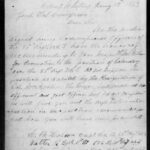In an earlier post, “Feuding in the Officers’ Ranks,” I described the squabbling among the Fifty-First’s officers that left the regiment with only one field officer for almost four months. In this three-part series I add further details gleaned from documents contained in the NARA compiled service records of some of the officers involved during this chaotic period of the regiment’s history.
The Companies Recommend New Officers
In October 1862, the 51st North Carolina’s first commander, Colonel John Cantwell, resigned and returned home. The second-in-command, Lieutenant Colonel William Allen, resigned after a few months to avoid a court-martial trial. By mid-January, Major Hector McKethan was the regiment’s sole field officer.
Per army regulations, McKethan would become the next colonel. The two senior captains, George Walker of Company A and Caleb Hobson of Company B, were next in line to be promoted to lieutenant colonel and major, respectively. But before the State could bestow the new ranks, the company officers intervened.
When the 51st North Carolina was mustered into service, the field officers were elected by the company officers. The company officers thought that election was a fine tradition, regardless of regulations. The officers met and drafted two petitions to send to brigade commander, General Thomas Clingman.
The first petition recommended Major McKethan for the colonelcy of the regiment. “The Major has made us an efficient and good officer,” the men wrote, “and we are confident he will give you and the Regt. entire satisfaction in the position.” The recommendation was unanimous; all the regiment’s commissioned officers signed the petition.
Then the officers drafted the second petition. Once again, they recommended Major McKethan to command the regiment. They also nominated Captains George Sloan and William Norment for lieutenant colonel and major. Eight companies’ officers signed the second petition. None of the officers of Companies A or B endorsed it.
Previous Petitions
A similar pair of petitions had been submitted by the officers the previous month. In a letter written to his father on December 14, Major McKethan mentions that two petitions “went to the Genl today signed by all the officers for me for Col and another signed by 27 officers for Sloan & Norment.” General Clingman likely rejected the petitions since Lt. Colonel Allen was still commanding the regiment at the time.
McKethan’s Endorsement
The officers handed their recommendation for field officers to Major McKethan on January 15, 1863. McKethan endorsed the petition and forwarded it to General Clingman. The major praised Sloan and Norment in his remarks:
“Capts Sloan and Norment are two of the best officers in the Reg and have been in service since the war began as Com officers – have ever shown themselves prompt & efficient and have the entire confidence of the Reg.“
McKethan Explains Further
On January 31, 1863, Major McKethan sent a letter to Clingman’s AAG, Captain Edward White. In the letter, McKethan explains why the 51st Regiment’s officers do not want Senior Captains Walker and Hobson promoted.
Captain Walker had a troublesome relationship with Colonel Cantwell from the start. Walker lied about the number of soldiers he mustered into Company A to inflate the size of his company. Colonel Cantwell accused Walker of making a “false muster,” preferred charges against the captain, and placed him under arrest. Cantwell withheld Walker’s commission for eight months. In addition to Walker’s issues with the former commander, the captain “is odious to most of the officers and men of the Reg and has the confidence of neither.”
As for Captain Hobson, McKethan considers him a good man, but he has no military experience, and “the company officers of the Reg object to his promotion with the same unanimity they do to Capt Walker. I consider him [Hobson] a better officer than Walker.”
Up the Chain
The petitions and McKethan’s letter start moving through the chain of command. On February 2, Clingman adds his endorsement, “I think the recommendation of the majority of the officers should be carried into effect.” He forwards the papers to General S. R. Gist.
General Gist remarks, “the vacancies should be filled at once to prevent disorganization that will inevitably ensue under the present status.” He recommends convening a board and examining the senior captains. If they pass the examination, then they should be promoted immediately. Gist forwards his recommendations to his boss, General W. H. C. Whiting.
On February 7, General Whiting recommends that Major McKethan be promoted. The other two ranks should be filled from the regiment by appointment “according to the recommendations herewith of the officers.” Whiting forwards the papers to General G. W. Smith. Smith approves Whiting’s endorsement and forwards the papers to the War Department in Richmond.
On February 14, 1863, the War Department returns the packet with the following comment: “The 51st N. C. Regt. is one of those regiments organized under State authority. The governor claims the right to appoint the officers.”
Outcome
Hector McKethan was promoted to colonel, effective January 19, 1863. The State decided the other two promotions would be by seniority, in accordance with regulations. However, Captain Walker was passed over; he resigned shortly thereafter. Captain Hobson became the new lieutenant colonel, and the next-senior captain, James McDonald of Company D, was promoted to major.
Copyright © 2021 – 2026 by Kirk Ward. All rights reserved.
